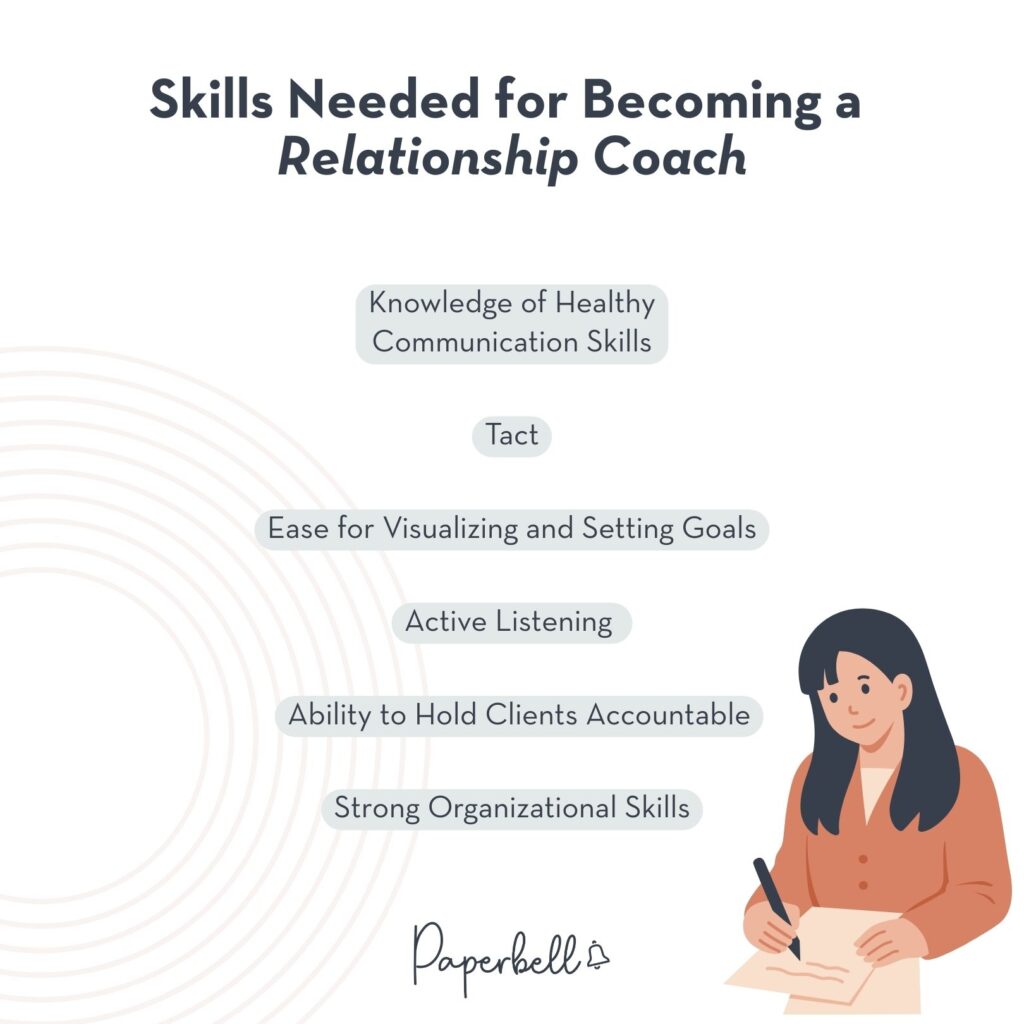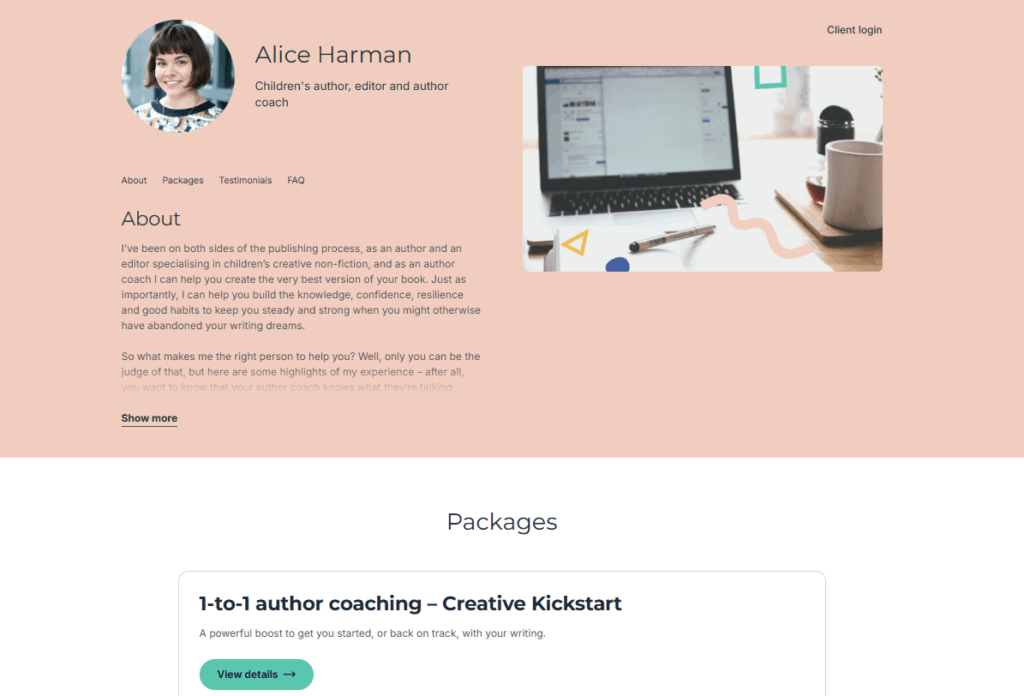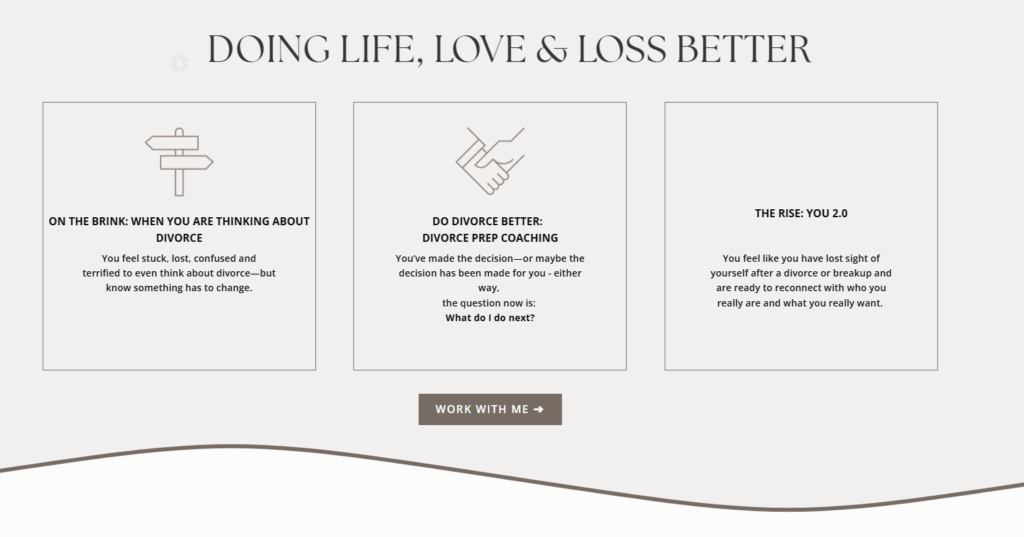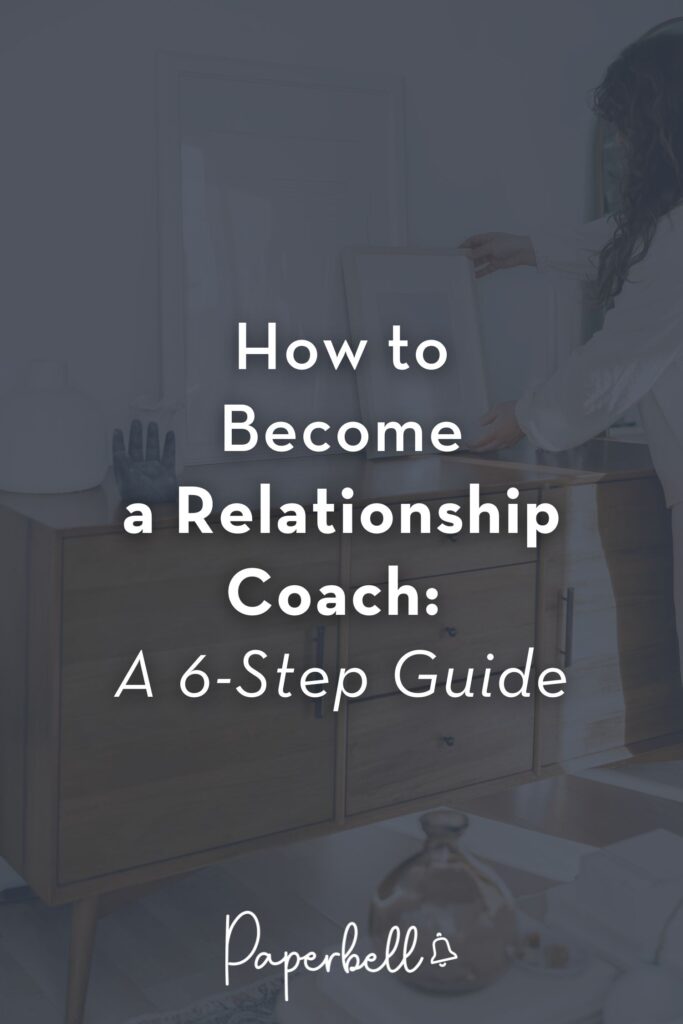Do you have a natural talent for guiding other people in their love lives? If so, have you ever considered becoming a relationship coach?
A relationship coach is someone who works with individuals or couples in a relationship. They work alongside their clients to help them find fulfillment and work through conflicts in a healthy way.
If reading the above made you sigh in envy, maybe this is the career path for you! Keep reading to discover exactly how to become a relationship coach and build your own thriving business.
Why Become a Relationship Coach?
If you’re the type of person who gets fulfillment from helping people in their relationships, becoming a relationship coach can be one of the best career choices.
You’ll find several of the same advantages you can get from becoming a life coach, such as:
- Working on your own schedule
- Getting paid to help people
- Flexibility to work where you want (and work with clients from all over the globe)
- Accelerating your own personal development
But relationship coaching is much more niche. And when you can prove you’re able to get results, it can be a highly lucrative and rewarding line of work.
Keep in mind that relationship coaches are different from dating coaches. While dating coaches help clients meet people and form new relationships, a relationship coach works to build on the foundations that make a relationship healthy over the long term.
Pro tip: Want to run your relationship coaching business as effortlessly as possible? Try Paperbell for free to launch your own beautiful coaching site and start selling and managing your coaching packages all in one place.
Skills Needed for Becoming a Relationship Coach

Relationship coaching isn’t an easy job. Just like other specialized coaching niches such as mental health coaching or integrative life coaching, it’s not something everyone can do.
Let’s explore some of the most crucial skills you need to support your relationship coaching clients.
Knowledge of Healthy Communication Skills
What’s the most important aspect of healthy relationships? Communication!
But healthy communication doesn’t come naturally to everyone. It’s a coaching skill you must learn, especially if it wasn’t modeled to you as you grew up.
Relationship coaches need an above-average mastery of communication for two reasons:
- They must communicate clearly with their clients to establish a solid coaching relationship.
- They must coach their clients to achieve healthy communication with their partner as well to achieve a fulfilling relationship.
If you’re someone who doesn’t yet have a handle on your communication skills, don’t despair. You can go through coaching certification programs to learn new techniques and coaching models.
Tact
Depending on your niche and your client’s current situation, there’ll be some sensitive issues to deal with as you coach them.
That’s why the best relationship coaches approach their clients with empathy and tact.
Ease for Visualizing and Setting Goals
Not all relationship coaching clients will be clear on what they want. And this can be especially challenging when you’re coaching a couple!
But that’s why they’ll come to you. And that’s exactly why a successful relationship coach must be able to visualize other people’s goals and help them clarify what it means to achieve them.
It takes a strong intuition and an ability to ask the right questions to determine what clients want. But taking those desires and painting a visual picture is what sets the best relationship coaches apart.
Active Listening
So how can relationship coaches ask the right questions? They know how to listen to their clients actively.
Some of your coaching clients may be in a situation where they feel unheard or unseen. And you’ll be the first person in a long time to truly see and hear them as they are.
By deeply listening and understanding your relationship coaching clients, you can get down to why they’re here and why they’re struggling to achieve the relationship they desire so deeply.
Ability to Hold Clients Accountable
Coaches aren’t teachers. Your job isn’t just to teach people how to build and maintain healthy relationships, but also to guide them into self-discovery and keep them accountable.
Think of yourself as a personal cheerleader for your coaching clients. Whenever they’re tempted to fall off the wagon or give themselves excuses, you can remind them of their goals. You’ll hold their hand as they make the difficult moves.
This is where relationship coaching can get uncomfortable. But for the right person, this type of work is more fulfilling than any other career path.
Strong Organizational Skills
The positive side of becoming a relationship coach and starting your own coaching business is that you get to decide everything.
The negative side is that you have to manage everything.
Responding to back-and-forths with potential clients. Making sure your clients pay their next installments before booking into your calendar. Reminding clients to book their next session.
It’s a lot.
Even the most organized coaches can run their businesses more smoothly using a tool like Paperbell!
With Paperbell, you can create your relationship coaching packages in minutes and launch a professional, branded website to display:
- All your coaching packages
- FAQs about your services
- Testimonials, if you have previous clients
- An email opt-in form to get people to join your coaching newsletter
- Your social media handles

But it’s not just a platform to host your packages. Paperbell handles everything to run your business, such as:
- Appointment booking and payments
- Automations such as appointment booking reminders
- Contract signing and intake questionnaires
- Payment processing (so nobody books into your calendar when they’re not supposed to)
- A user-friendly client portal so your clients can view files and resources you’ve shared with them, contracts, questionnaires, and more
Whether you’re already running your business or considering becoming a brand new relationship coach, try Paperbell for free to see how simple it can be to sell your coaching online.
Requirements and Certifications to Be a Relationship Coach
Relationship coaching is a complicated field that has more than one potential path.
First, it’s important to note that no coaching niche is regulated. While there are recognized organizations such as the International Coaching Federation (ICF), they don’t make laws around coaching.
This means you could legally open up your own coaching practice today, even if you have no knowledge or prior experience.
Would that be a good idea? Probably not. If you have no relevant experience in the field of relationships, it’s hardly ethical to charge other people for coaching around that topic.
But what it does mean is that you don’t need to go through a specific certification or program to become a relationship coach.
However, certifications will help you in two ways:
- Develop vital skills to coach your clients so they can get results successfully.
- Gain credibility with your potential clients.
The path you take is up to you. But if you feel like you have more to learn about how to take your knowledge about relationships and start coaching people with it, consider getting certified!
How to Become a Relationship Coach
Want to start your own relationship coaching business?
If you want to get certified before you do, here’s your 6-step plan. If you already have a relationship coaching certification, or if you want to skip that process instead, then skip steps 2 and 3.
1. Choose your relationship coaching niche.
Relationship coaching is already a life coaching niche. But did you know that you can niche even further?
By niching down, you become the ideal coach for your dream clients and repel everyone else who doesn’t fit the bill.
And the more people you coach in this niche, the more experience and credibility you’ll gain specifically in that niche.
For example, you could coach:
- People who’ve just gone through a divorce
- College-aged women who need to develop self-assertiveness and confidence in their first serious relationships
- Couples who are struggling to nurture their relationships as new parents
It all depends on your prior life experience and what you’re interested in.
For example, Coach Cindy Stibbard offers relationship coaching both for people considering divorce, or those who have decided to go through divorce and want to be better prepared:

2. Enroll in an accredited relationship coaching program.
If you search “relationship coach training program” online, you’ll find hundreds, if not thousands, of results.
But if you want to get a certification, it’s important to vet which program you choose carefully.
For example, the International Coaching Federation (ICF) has a list of vetted programs they recognize for their coaching certification. However, it’s possible to get certified with a non-accredited program as long as you can prove the curriculum is up to the ICF’s standards.
To shorten your search, we’ve found four relationship coaching certifications accredited by the ICF:
- World Coaching Institute’s Relationship Coaching Certification
- Institute for Professional Excellence in Coaching (iPEC)
- Coach Training World’s Whole Person Coach Certification
- Erickson Coaching International’s The Art & Science of Coaching
You can also check out our complete relationship coaching certification guide for more info on each of these programs.
3. Get certified as a relationship coach.
Once you go through the program you’ve chosen, it’s finally time to apply for your certification.
Should you choose to get certified by the ICF, there are three levels of certification you can choose from:
- Associate Certified Coach (ACC)
- Professional Certified Coach (PCC)
- Master Certified Coach (MCC)
If you’re brand new to the relationship coaching industry, you should start with the ACC. You can also opt to get certified as a PCC right away, but that’ll require 500+ hours of coaching experience.
During the certification process, you’ll need to submit your coaching logs as well as complete a performance evaluation and the ICF Credentialing Exam. If your chosen program didn’t include Mentor Coaching, you’ll also have to complete 10 hours separately.
4. Build your offer suite.
Now that you’re certified and have some coaching experience under your belt as part of your training, it’s time to take the first step in building your relationship coaching business:
Creating your coaching offers!
An “offer” is different from the coaching sessions or coaching programs you sell. It includes the promise you make to your future clients. For example:
“I’ll help you build a healthy relationship after your divorce.”
Once you know what kind of end result or transformation you want to help people achieve, you can work backward to build your coaching packages:
- How many sessions do you believe it will take to achieve that result?
- How often do you feel you should meet with clients?
- What other resources do you think they’ll need to get where they want to be?
These are all of the details you can build into your package.
5. Find your first relationship coaching client.
Once you’re clear on what you want to sell, it’s time to go out there and land your first client.
Reach out to people in your network to find out if anyone you know could need your services. Or maybe a friend of a friend will need you!
You can also sign up for CoachCompare (it’s free!) to get found by people looking for the exact type of relationship coach you’ll be.
Keep in mind that your coaching offer will most certainly change over time.
The more you learn about your dream clients — their pain, their desires, their biggest challenges — the more you’ll be able to tweak your coaching packages in a way that gets people to say “yes” to you.
6. Expand your reach.
Word-of-mouth and referrals from your network are great ways to land your first relationship coaching client. But if you want to grow your coaching business, consider expanding your audience and connecting with new people through marketing.
You can read more about our favorite marketing strategies for coaches below:
For best results, start with a single strategy. Then, once you’ve perfected that specific strategy, feel free to expand elsewhere to replicate your first success.
How Much Do Relationship Coaches Make?
The beauty of relationship coaching is that you’ll have no cap on your earning potential. However, you can’t start charging $500 per session as a beginner, either.
The average beginner relationship coach typically charges between $60 and $150 per session. With that being said, you can significantly increase your rates by selling packages instead of sessions, especially when you promise specific results that people deeply want.
FAQs About How To Become A Relationship Coach
How do I become a certified relationship coach?
Enroll in an ICF-accredited program like World Coaching Institute or iPEC, complete the training, gain coaching hours, and apply for certification. If you’re a beginner, start with the Associate Certified Coach (ACC) level.
Can you be a relationship coach without a degree?
Yes, coaching niches aren’t regulated and no specific degree is required. However, getting certified through reputable programs helps you develop skills and gain credibility with potential clients. Consider a relationship coach certification program to learn relationship coaching techniques.
What’s the easiest way to create coaching packages for relationship coaches?
Use platforms like Paperbell to quickly build packages, set up payment processing, manage bookings, and create a professional website to showcase your services and entire coaching practice all in one place.
Become a Certified Relationship Coach Today
No matter which type of coach you are, one of the biggest hurdles to building a successful coaching business is the administrative headache of managing your coaching services.
That’s why we built Paperbell — to help coaches sell their coaching online, the crazy-simple way. Create your free account today!

Editor’s Note: This post was originally published in February 2023 and has since been updated for accuracy.









